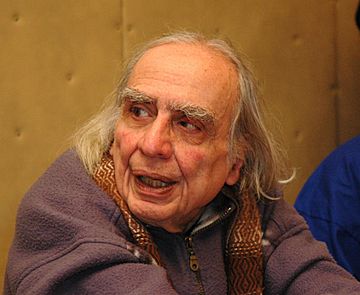Givi Margvelashvili facts for kids
Quick facts for kids
Giwi Margwelaschwili
გივი მარგველაშვილი |
|
|---|---|

Giwi Margwelaschwili in Berlin in 2008
|
|
| Born | 14 December 1927 |
| Died | 13 March 2020 (aged 92) |
| Education | Tbilisi State University |
| Occupation |
|
| Organization |
|
| Awards |
|
Giwi Margwelaschwili (Georgian: გივი მარგველაშვილი Givi Margvelashvili; December 14, 1927 – March 13, 2020) was a German-Georgian writer and thinker. He was born in Berlin, Germany, to Georgian parents and grew up speaking German.
After World War II, a secret police group from the Soviet Union took him and his father away. His father, Tite Margwelaschwili, was sadly killed. Giwi was held in a camp called Sachsenhausen concentration camp for 18 months. Even though he didn't speak Russian or Georgian, he was then sent to Tbilisi, Georgia, where some of his relatives lived. He learned both languages and also studied English. He worked as a language teacher. He wrote many novels and philosophy books in German. In 1994, he moved back to Germany and became a German citizen. He returned to Tbilisi in 2011.
Contents
Giwi's Early Life
Giwi Margwelaschwili was born in Berlin. His father, Tite Margwelaschwili, was a well-known Georgian intellectual, which means he was a very smart and educated person. His father had moved to Germany in 1921 after the Red Army invasion of Georgia. He led a group of Georgians living in Berlin who were involved in politics.
From 1934 to 1946, Giwi went to several different schools in Berlin. This was because of the bombing during World War II. He also joined an anti-Fascist youth group called the Swing Kids. These groups were against the Nazi government. He loved swing music and went to jazz clubs.
Life During and After World War II
Near the end of World War II, Giwi and his father escaped from Germany to Italy. Giwi's sister, Elisabeth, lived there. While she stayed in Italy, Giwi and his father went back to Berlin.
In December 1945, Giwi and his father were taken by the Soviet secret police, known as the NKVD. After eight months of questioning, his father was killed. Giwi was held in a prison camp called Hohenschönhausen and then in the former Sachsenhausen concentration camp. He later wrote about this camp, calling it "Sachsenhäuschen," a smaller version of its name. He said he didn't write much about the terrible things he saw there because he wanted to leave those memories behind.
After 18 months in the camp, he was set free. But he was not sent back to Berlin. Instead, he was sent to live with his relatives in Tbilisi, Georgia.
Learning and Teaching in Georgia
When Giwi arrived in Tbilisi, he had to learn Georgian and Russian. He also studied English at Tbilisi State University. From 1954 to 1970, he taught English and German at the Tbilisi Institute of Foreign Languages. During the 1950s, he started writing his first novels and philosophical works. His philosophy focused on something called phenomenology, which is a way of studying how we experience things.
In 1969, Giwi was allowed to travel to West Germany for the first time since 1946. He went as a translator for the Rustaveli Theatre. In 1970, his first academic paper was published. It was about "The role of language in Heidegger's philosophy."
In 1971, he joined the Institute of Philosophy at the Georgian Academy of Sciences. He then started publishing more philosophical writings. He visited a dissident (someone who disagrees with the government) and songwriter named Wolf Biermann in Berlin. Because of this visit, he was not allowed to leave the Soviet Union until 1987. In 1972, he met Heinrich Böll, a famous writer from West Germany who had won the Nobel Prize in Literature. Böll was very impressed by Giwi's unpublished autobiography, Kapitän Wakusch, and tried to help him get a passport, but it didn't work.
Return to Germany and Later Life
With the help of a human rights activist named Ekkehard Maaß, Giwi moved to Berlin in 1990. He became a German citizen in 1994. In 1991, his first autobiography, Muzal. Ein georgischer Roman, was published in Germany. Many other books followed, including novels, philosophical essays, and poems. These books quickly became well-known both in Germany and other countries. However, many of his works were still not published.
In 1995, he won the Literature Prize of Brandenburg. He became a member of International PEN, an organization for writers. He also received a special scholarship from the president of Germany. The University of Bamberg made him a professor of poetry. The Academy of Arts, Berlin, gave him the Kunstpreis Berlin award for all his life's work. In 2006, the Goethe Institute gave him the important Goethe Medal. He also received an honorary doctorate, which is a special degree, from Tbilisi State University. He moved back to Tbilisi in 2011.
In 1970, Giwi married Naira Gelashvili, who was also an author and studied German language and literature. Their daughter, Anna, also studies German language and literature. Giwi Margwelaschwili passed away in Tbilisi on March 13, 2020.
See also
 In Spanish: Giwi Margwelaschwili para niños
In Spanish: Giwi Margwelaschwili para niños
 | William M. Jackson |
 | Juan E. Gilbert |
 | Neil deGrasse Tyson |

